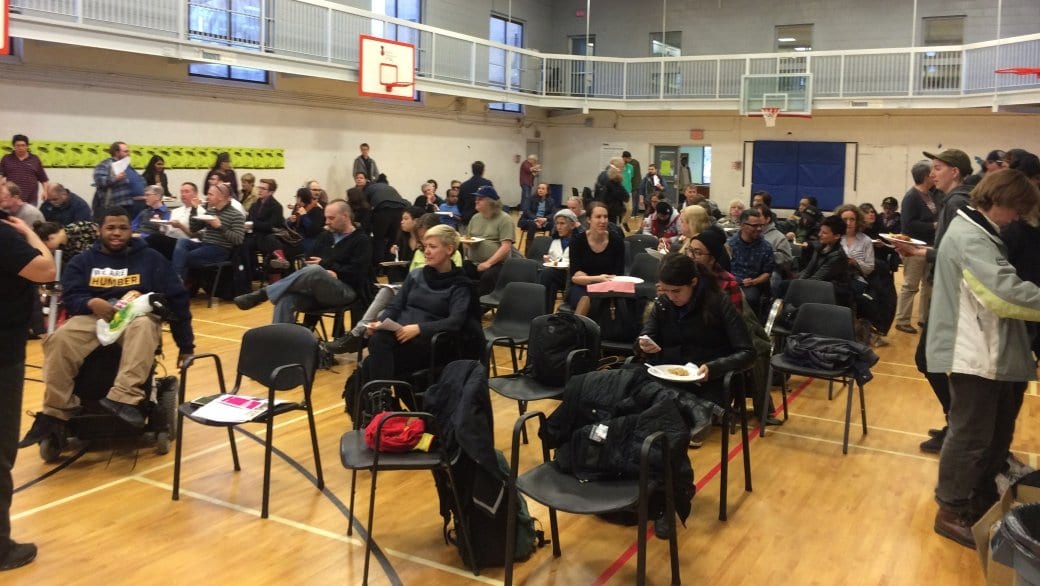Close to 100 community members opposed to changes in their downtown Toronto east neighbourhood gathered this week to express concerns over The 519’s plans to build a new recreation centre in Moss Park. The meeting was organized by the Queer Trans Community Defence on April 7, 2016, at the John Innes Community Centre.
The 519, Toronto’s LGBT community centre, and the City of Toronto are currently conducting a feasibility study to see if Moss Park could be a suitable location for the new sports centre. While originally framed as providing LGBT-specific programming, the project has since widened its scope and aims to be inclusive of both queer residents and current community members, many of whom are marginalized individuals. However, organizers of Thursday’s meeting are questioning this change in rhetoric.
“We have very little faith in The 519 people and the city people really being effective advocates for the Moss Park people,” says Helen Jefferson Lenskyj, a member of the Queer Trans Community Defence. “How can The 519 serve this community when they’ve been focused on a vastly different community at Church and Wellesley?”
The threat of gentrification — and what that could mean for current residents — is the main concern for many of those opposed, who feel that the proposed changes would push out the homeless, drug users and sex workers who currently use the park and surrounding area.
“Where are you expecting us to go? You can’t scrub us off the face of the city,” said Syrus Marcus Ware via recorded video message. Ware, an artist and community activist, called into question how inclusionary the Church and Wellesley neighbourhood has been for queer individuals who are not white and middle class. He said that marginalized folks were at the forefront of the queer rights movement, making the pressure being put on them to make room for non-marginalized queer folk even more poignant.
“As radical queer and trans people, we need to stand in solidarity with the residents of Moss Park,” he said.
Opponents to the Moss Park redevelopment have cited The 519’s Sunday afternoon drop-in for underhoused individuals as a reflection of their concerns. Anyone wishing to make use of the drop-in program must confirm they’re part of the LGBT community. If they’re not, they’re directed to the nearest shelter. Opponents say this demonstrates how The 519 doesn’t have the institutional expertise to provide inclusive programming and services for the diverse residents of Moss Park.
However, both The 519 and the City say the fears presented are unfounded.
“For us, we think there’s a tremendous opportunity to bring in private philanthropic money to help support the community infrastructure,” says Maura Lawless, executive director of The 519. She’s referring to an anonymous donation received by The 519 to fund the feasibility study and a portion of the costs of building the proposed centre.
“We have to be able to figure out how to have a conversation together and how we create a community space and community that really is inclusive and welcoming for everyone, including marginalized individuals and vulnerable folks,” Lawless says, emphasizing the community consultation process The 519 is about to undertake.
“Our goal and our intent is to engage with people as much as possible through the process to make sure that any new facility we build meets the need of the people who are connected to Moss Park,” she says.
Opponents aren’t convinced.
“That’s bullshit,” Lenskyj says. “[Marginalized individuals] will not have a voice at those meetings. The condo owners will have a voice and it’ll be a total whitewash.”
Another gentrifying threat looms in the form of three condos that are slated to be built in the neighbourhood, just east of Queen and Sherbourne.
“I think it’s important to note that there might be a few suspicious minds out there who think there’s a massive gentrification schedule, but quite honestly they have to prove that because it’s completely unproven,” says Councillor Kristyn Wong-Tam, who represents the residents of Moss Park. “Everything we have been doing has been trying to meet the needs of the community, and the needs of the community are: they desperately need recreation community space.”
There is currently no money slated to upgrade any of the existing Moss Park facilities in the next few years, which Wong-Tam says is reason enough to see if The 519 project could be a good fit.
Opponents are also questioning the actual necessity of having a complex dedicated to LGBT sports.
“I’m a sports sociologist, I’m very familiar with the development of gay sport in Toronto and I know that overall you can say it’s a success story,” Lenskyj says. Instead, the Queer Trans Community Defence would like to see inclusive practices incorporated into existing city recreational facilities, placing a queer-friendly framework over every site, instead of building an entirely new one.
However, nothing has been finalized yet. The 519 has until the end of the year to present the results of their feasibility study to council.
“Just before everybody decides to tear it up, they also need to know that it’s not funded,” says Wong-Tam. “I love it when the community decides to tear something down before it’s even built.”

 Why you can trust Xtra
Why you can trust Xtra


